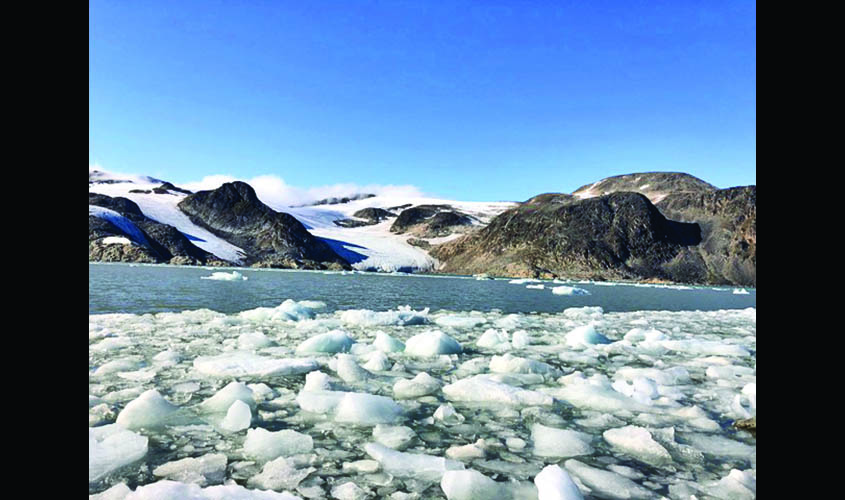It was revealed that Arctic has not featured in recent UK security policy documents as the Antarctic occupies greater part of the Polar Regions Department’s time.
The Arctic has implications far beyond its geographical area. This area is warming twice as fast as anywhere on earth. The Arctic Ocean is transitioning from being permanently ice-covered to seasonally ice-free as soon as 2050. The possibility of exploiting its natural resources (oil-gas-rare earth metals and minerals) that have previously been inaccessible or commercially unviable to access, increases. The UK Defence Committee has examined the situation in their report “On Thin Ice: UK Defence in the Arctic”, released on 15 August. Typically, this has been a region of low tension governed by an array of international treaties and multilateral agreements relating to scientific, environmental and commercial activity.
The report indicates some increased military activity from the Russian Federation in the region and showcases the associated risks. Their concern is the UK Armed Forces may be under-resourced to deploy effectively in the Arctic region.
It seems rights to the North West Passage, the Northern Sea Route are in contention between Canada, US and Russia. The Norwegian sovereignty of the Svalbard archipelago is being tested by Russian behaviour. Apparently, the possibility of further adventurism by a resurgent and revisionist Russia cannot be discounted. The Committee heard views across the spectrum—from there is no offensive intent behind Russia’s military build-up, it is simply trying to regenerate military capacity in order to reassert sovereignty, to this is one more part of Russia’s aggressive reassertion of great power competition.
James Gray MP pointed out that the complex position of Svalbard in international law might act as an encouragement to an aggressor, as NATO might be unable to come to a decision on whether it was entitled to intervene. But Colonel John Andreas Olsen, Norwegian defence attaché to the UK said an attack on Svalbard would constitute an Article 5.
China, India and South Korea also have research facilities on Svalbard. Professor Caroline Kennedy-Pipe, University of Hull, noted how India is now describing itself as a polar player, with extensive interests in the South Pole, but increasingly, India has a vested interest in the Arctic. As the High North melts, Bangladesh will be hugely affected; how will India cope with the quantities of refugees from environmental chaos? China’s presence was generally felt to be economically and scientifically orientated. The Northern Sea Route was equated to a Polar Silk Road, part of the BRI globalisation initiative. The recent People’s Liberation Army Navy activities raised a potential linkage between Chinese interest in the Arctic and China’s increasing international presence as a naval power.
The Second World War provided a clear demonstration of the strategic importance of the region to the UK. Norway’s occupation by a hostile power introduced the prospect of UK invasion from across the North Sea, averted by the Arctic convoys, who braving the appalling conditions, supported the Soviet Union. During the Cold War, Norway became an important strategic base, with the admission to NATO in 1949 establishing the “Northern Flank”. Although Norway’s strategic goal is to be a region characterised by peace, stability and international cooperation, they have embarked on a defence capability modernisation programme. This autumn, Norway will host Exercise Trident Juncture, due to involve 35,000 personnel from 30 NATO members and partners.
It was revealed that the Arctic has not featured in recent UK defence and security policy documents as the Antarctic occupies the greater part of the Polar Regions Department’s time. The Committee heard from Mark Lancaster, Minister for the Armed Forces: “It is fair to say that we are seeing a level of activity by the Russians that we probably have not seen since the end of the Cold War. They are building up their capabilities. That has been well documented recently in speeches by both the Chief of the General Staff and the Chief of the Defence Staff.”
From the Russian point of view the Arctic is greatly significant for a broad range of historical, cultural, economic and security reasons. Protecting national interests in the Arctic region appeared as a core task in the 2015 revision of the Military Doctrine of the Russian Federation. In presenting the 2015 Maritime Doctrine to President Vladimir Putin, the Russian Deputy Prime Minister said that the two areas of focus were the Arctic and the Atlantic, due, amongst other reasons, to the growing proximity of NATO to Russia’s borders. The Committee noted the expansion of Russia’s Northern Fleet, Russian Naval activity, Arctic air patrols and the establishment of land bases for Russian troops, plus the increased tempo of exercises and training vents.
Of particular concern to UK is the threat to undersea data cables and Britain’s under ice capability which the report suggests need investment. The HMS Trenchant nuclear-powered submarine was congratulated for surfacing through the icy north of Alaska in March 2018 as part of ICEX 18.223. The boat repeated breaking through the ice on several occasions over the next few weeks, including at the North Pole. It is hoped that this is part of a permanent cycle of activity in the Arctic.
The Committee concludes by asking the Government to appoint an Arctic ambassador to improve co-ordination of policy in Whitehall and bolster UK representation in Arctic affairs.

